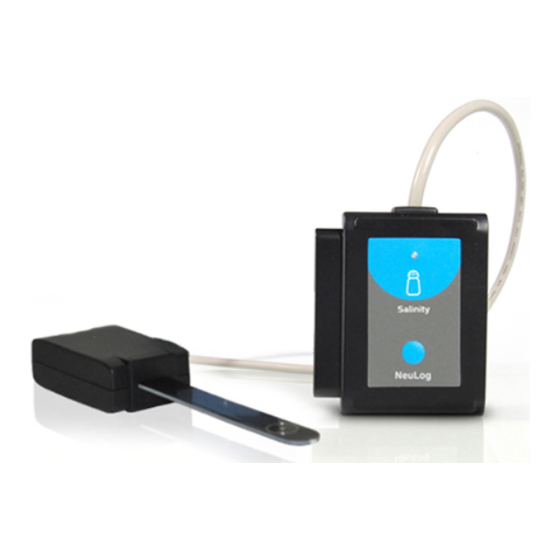
Advertisement
Quick Links
NeuLog salinity logger sensor
NUL-228
The NeuLog salinity sensor can be used for any science experiment which utilizes
solutions with a saline (salt) component such as in the fields of Chemistry, Biology,
Earth Science, Environmental Science, Biochemistry, Physics, etc.
The sensor comes pre-calibrated so you can start experimentation right out of the box
using this guide.
Among hundreds of possible experiments that can be performed with the NUL-228
sensor are: Monitoring of ecological systems, chemical analysis and identification,
environmental health testing, water quality testing, chemical properties, properties of
electricity, etc.
The NeuLog salinity sensor sensor's measurement units are:
Percentage (%): The total saline percentage out of the whole sample
Parts per million (ppm): The number of salt molecules per million molecules
Milligrams per liter (mg/L): The total mass of dissolved salts per liter of
volume.
Probe usage and care:
The probe has two flat electrodes with known surface areas and distance between
them. A signal is supplied to the electrodes and by testing the signal behavior, the
salinity of the solution is calculated.
General care:
During measurements, make sure that the electrodes (in the shape of a circle
with a dot inside) are covered with the liquid.
Avoid touching the probe's flat surface, if possible.
Never submerge the probe's or sensor's plastic body in any liquid.
Gently rinse the electrodes with distilled water after each use and between
samples to avoid damage and contamination.
Handle and store with care to avoid damaging or chipping the electrodes.
NEULOG SALINITY LOGGER SENSOR GUIDE
Quick start procedure:
PC or Mac Computer
Materials needed:
NUL-228 Salinity Sensor
USB-200 USB Module
USB to mini USB cable (included with the USB-200 module)
Your salinity sensor needs to be connected to a USB-200 module. The USB-200
module then connects to a computer via a USB to mini-USB cable. Please note that
you cannot plug the salinity sensor directly into the computer.
The browser based application can be downloaded for free at
well as a full application user guide.
Choose "Downloads" on the main menu and then choose "Software and Application".
Procedure:
1.
Install the NeuLog application.
2.
Connect the USB-200 module to the PC or Mac.
3.
Connect the salinity sensor to the USB-200 module (they directly plug together).
Please note there is no calibration required for this sensor.
4.
Open the NeuLog application by clicking on the shortcut on the screen.
5.
Once a salinity sensor module box appears on the left side of the screen the
probe has been automatically identified and you can begin experimentation.
If the salinity sensor is not automatically identified, click on the "Search for
6.
sensors" icon to find the sensor.
Click on the "On-line experiment" icon; this will open a graph below.
7.
Click on the "Module setup" button located in the salinity sensor module box to
8.
change the sensor's settings if need be.
9.
Click on the "Experiment setup" icon to change the experiment settings if need
be (experiment duration for example).
10.
The salinity sensor will give a live reading in the module box to the left of the
screen while plugged in.
To run an experiment and collect data click the "Run experiment" icon.
11.
To end data collection early, click the "Stop experiment" icon.
12.
www.NeuLog.com
as
Advertisement

Summary of Contents for NeuLog NUL-228
- Page 1 NeuLog salinity logger sensor Quick start procedure: NUL-228 PC or Mac Computer The NeuLog salinity sensor can be used for any science experiment which utilizes Materials needed: solutions with a saline (salt) component such as in the fields of Chemistry, Biology, ...
- Page 2 NeuLog WiFi network which will stream the NeuLog data click the "Run experiment" icon. to a device of your choosing. Once your device is wirelessly connected to the NeuLog If you have a newer generation WIFI-201 module (with the USB icon on the...
- Page 3 "Salinity logger sensor". In order to find the science experiments, choose "Experiments" on the main menu of the NeuLog website, then choose "Physics", "Chemistry", "Biology" or NeuLog NUL-228 Salinity Sensor Guide (this document) "Environmental Science". ...
- Page 4 Sensors in each plastic NeuLog body. This technology allows the sensor to collect and then with a shelf life such as ion selective probes have a warranty of 1 year. Should you store the digital data in the correct scientific units ( F, Lux, %, ppm, for example).













Need help?
Do you have a question about the NUL-228 and is the answer not in the manual?
Questions and answers